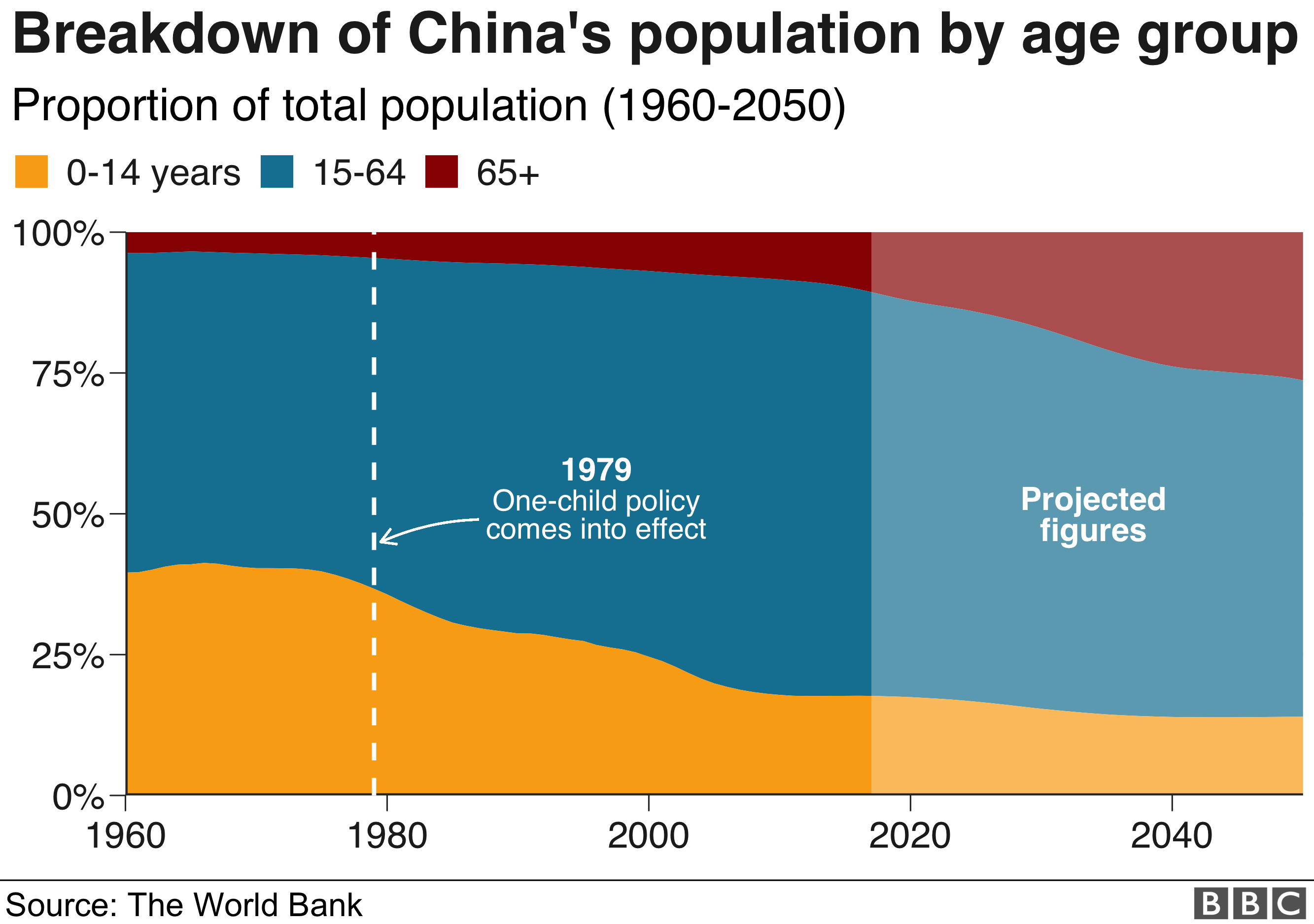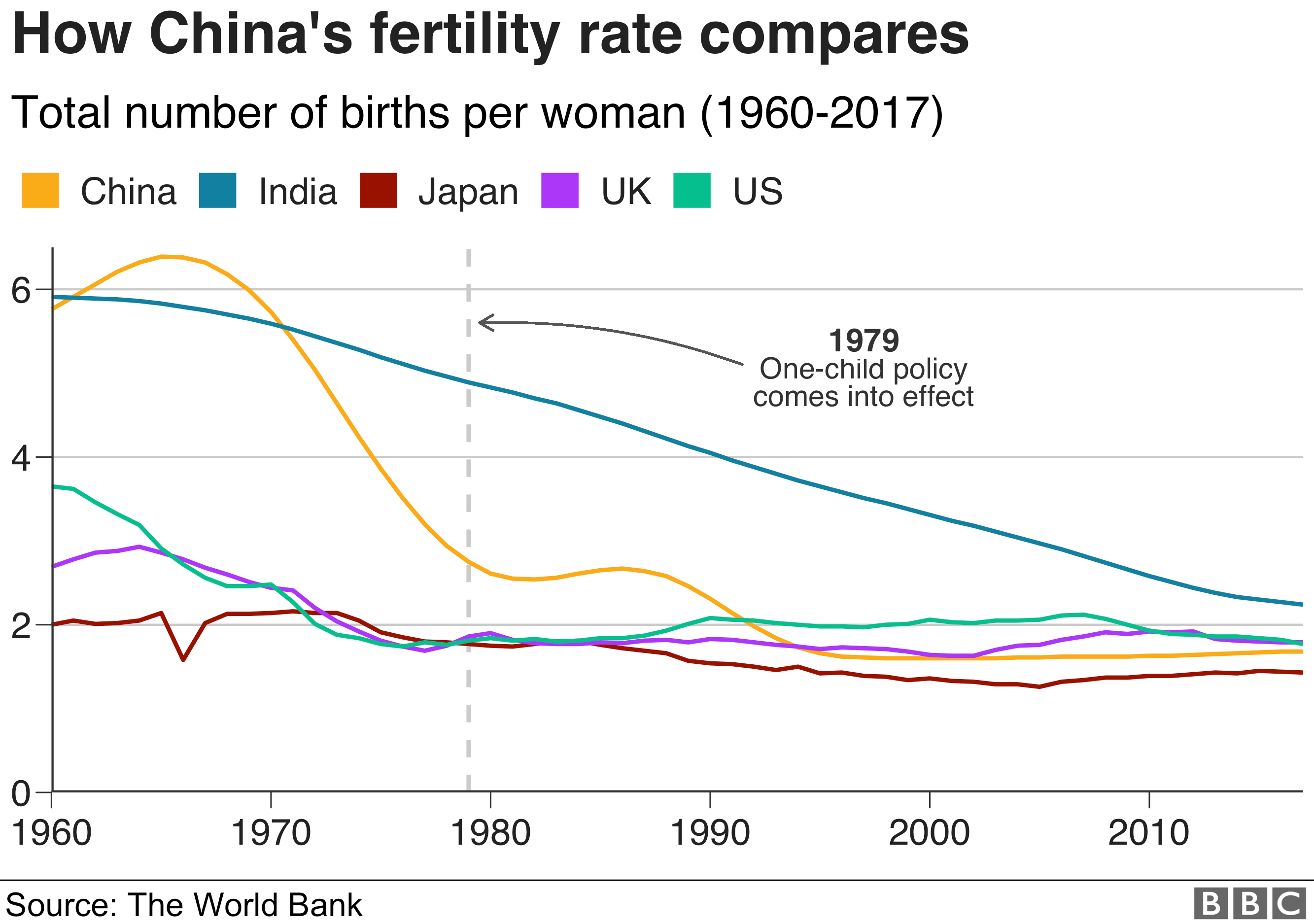China's birth rate has fallen to its lowest since the formation of the People's Republic of China 70 years ago - despite the easing of the one-child policy.
The birth rate was 10.48 per thousand in 2019 - the lowest since 1949, the National Bureau of Statistics said.
The number of babies born in 2019 dropped by 580,000 to 14.65 million.
The country's birth rate has been falling for years - posing a challenge for the world's second biggest economy.
Despite the birth rate falling, a lower death rate meant China's population hit 1.4 billion in 2019, inching up from 1.39bn.
But the falling birth rate is raising fears of a "demographic timebomb" - that is, a smaller working-age population having to support a bigger, retired population.
 But the policy has been blamed for a severe gender imbalance - with males still outnumbering females by more than 30 million in the 2019 figures.
In 2015 the government ended its one-child policy allowing couples to have two children.
But that reform has failed to reverse the country's falling birth rate - despite a two-year increase immediately afterwards.
Experts say this is because the relaxing of the policy did not come with other relevant changes that support family life - such as monetary support for child care and increased paternity leave.
Most people can't afford more than one child, they say.
But the policy has been blamed for a severe gender imbalance - with males still outnumbering females by more than 30 million in the 2019 figures.
In 2015 the government ended its one-child policy allowing couples to have two children.
But that reform has failed to reverse the country's falling birth rate - despite a two-year increase immediately afterwards.
Experts say this is because the relaxing of the policy did not come with other relevant changes that support family life - such as monetary support for child care and increased paternity leave.
Most people can't afford more than one child, they say.

China's falling birth rate
Source: China Statistical Yearbook China's birth rate is lower than the US which stood at 12 per thousand people in 2017 (the most recent data available), but higher than Japan's figure of 8. The overall global birth rate was 18.65 in 2017, according to the World Bank. In 1979, the Chinese government introduced a nation-wide "one-child policy" - with various exceptions - to slow population growth. Families that violated the rules faced fines, loss of employment and sometimes forced abortions. But the policy has been blamed for a severe gender imbalance - with males still outnumbering females by more than 30 million in the 2019 figures.
In 2015 the government ended its one-child policy allowing couples to have two children.
But that reform has failed to reverse the country's falling birth rate - despite a two-year increase immediately afterwards.
Experts say this is because the relaxing of the policy did not come with other relevant changes that support family life - such as monetary support for child care and increased paternity leave.
Most people can't afford more than one child, they say.
But the policy has been blamed for a severe gender imbalance - with males still outnumbering females by more than 30 million in the 2019 figures.
In 2015 the government ended its one-child policy allowing couples to have two children.
But that reform has failed to reverse the country's falling birth rate - despite a two-year increase immediately afterwards.
Experts say this is because the relaxing of the policy did not come with other relevant changes that support family life - such as monetary support for child care and increased paternity leave.
Most people can't afford more than one child, they say.

China's one-child policy
John Sudworth examines the painful legacy of China's one-child policy- Introduced in 1979, the policy meant that many Chinese citizens - around a third, China claimed in 2007 - could not have a second child without incurring a fine
- In rural areas, families were allowed to have two children if the first was a girl
- Other exceptions included ethnic minorities and - since 2013 - couples where at least one was a single child
- Campaigners say the policy led to forced abortions, female infanticide, and the under-reporting of female births
- It was also implicated as a cause of China's gender imbalance
DISCLAIMER: The Views, Comments, Opinions, Contributions and Statements made by Readers and Contributors on this platform do not necessarily represent the views or policy of Multimedia Group Limited.
Latest Stories
-
Kumasi to host Joy Prime’s Big Chef Tertiary S2 finals
10 mins -
KOD hints at releasing an album before he turns 50
16 mins -
2024 Election: NDC accuses NPP of printing fake ballot papers
24 mins -
A democracy that fails to solve its own problems is a questionable democracy – Dr Muhammad Suleiman
27 mins -
Our fight against corruption is more talk, less action – Mary Addah
34 mins -
CHRAJ report settles matters against Kusi Boateng – Lawyer
40 mins -
Growing dissatisfaction with democracy demands citizen-centered governance – Mavis Zupork Dome
43 mins -
Ghana’s Democracy: Choices, not elections will drive change – Benjamin Offei-Addo
48 mins -
PRESEC-Legon marks 86 years with launch of groundbreaking AI lab on November 30
52 mins -
Limited citizen participation threatens Ghana’s democracy – Prof. Kwesi Aning
1 hour -
Contractor storms basic school to drive out students from classroom, claiming government owes him
1 hour -
The quest for peaceful election: religious and traditional leaders should be part of election observers
1 hour -
NDC has better policies to boost economy through agricultural, oil sectors – Ato Forson
1 hour -
Yaw Ampofo Ankrah calls for Kurt Okraku and Executive Council to resign over AFCON failure
2 hours -
Coalition of teachers to boycott December election over unpaid salary arrears
2 hours

